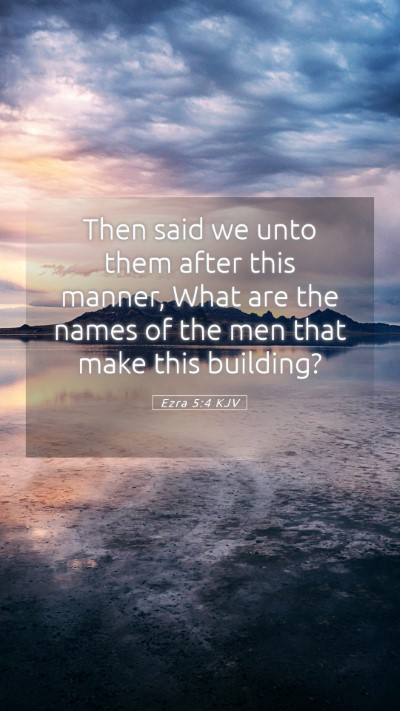Old Testament
Genesis Exodus Leviticus Numbers Deuteronomy Joshua Judges Ruth 1 Samuel 2 Samuel 1 Kings 2 Kings 1 Chronicles 2 Chronicles Ezra Nehemiah Esther Job Psalms Proverbs Ecclesiastes Song of Solomon Isaiah Jeremiah Lamentations Ezekiel Daniel Hosea Joel Amos Obadiah Jonah Micah Nahum Habakkuk Zephaniah Haggai Zechariah MalachiEzra 5:4 Meaning
What is the meaning of Ezra 5:4?
Then said we unto them after this manner, What are the names of the men that make this building?
Ezra 5:4 Bible Verse Meaning
Bible Verse Meaning of Ezra 5:4
The verse Ezra 5:4 states:
"Then said we unto them after this manner, What are the names of the men that make this building?"
This verse occurs in the context of the rebuilding of the Temple in Jerusalem after the Babylonian Exile. The inquiry regarding the names of the builders reflects a concern for accountability and proper record-keeping among those who undertake significant works for God.
Understanding Ezra 5:4
The following sections summarize interpretations from prominent public domain commentaries, providing insights into the meaning of this verse.
Insights from Commentaries
-
Matthew Henry:
Henry comments that this question about the names of the builders indicates how those in authority are held accountable in their endeavors. They discerned that a significant work for God warrants a declaration of intentions and identities, emphasizing the importance of transparency and oversight in spiritual matters.
-
Albert Barnes:
Barnes highlights that the inquiry signifies a deeper concern over the authority and purpose behind the rebuilding efforts. He notes that asking for the names was a means of establishing legitimate leadership and a proper framework for governance in the construction process, reflecting the need for orderliness in God’s work.
-
Adam Clarke:
Clarke suggests that the query indicates a potential resistance to these builders’ actions. By demanding to know who was behind the work, the authorities were likely concerned about unauthorized activities. This reflects the broader theme of God’s people facing challenges and opposition while fulfilling His command to rebuild.
Thematic Elements
This verse forms an integral part of the narrative that emphasizes themes such as accountability, leadership, and the challenges faced during the process of restoring what was lost. Below are key points regarding these themes:
-
Accountability:
The inquiry into the names of the builders represents a call for accountability, a hallmark of responsible leadership. It reminds us that in all endeavors, especially in spiritual tasks, those involved should be recognized and held accountable.
-
Leadership Recognition:
By identifying the builders, the community distinguishes responsible leaders who undertake significant works. This essential feature fosters unity and encourages collective ownership of the task.
-
Opposition and Challenges:
The context of this question also implies potential pushback against the builders’ work. It serves as a reminder that faith-driven initiatives may face challenges that require courage and perseverance.
Biblical Cross References
This verse connects with various other scriptural references that highlight similar themes:
- Ezra 3:8-10: The commencement of the Temple construction.
- Nehemiah 4:1-3: The opposition faced during rebuilding efforts.
- 1 Chronicles 28:10: The importance of being strong and doing the work appointed by God.
- Psalm 127:1: The principle that unless the Lord builds the house, the builders labor in vain.
Concluding Thoughts
In conclusion, Ezra 5:4 encapsulates vital principles relevant both in historical and contemporary contexts. It speaks to the importance of recognizing those who serve in God’s work, maintaining accountability, and adhering to a structured approach to collective efforts.
For further Bible study insights, this verse encourages readers to delve deeper into how the responsibilities of builders, both physically and spiritually, play out in their own lives. Understanding Scripture can involve examining not only the text but also its larger context and implications for our daily lives.


